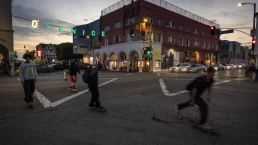Los Angeles officials are struggling to crack down on illegal rentals during a housing crisis. Here’s how to make sure you’re a responsible vacationer.
By Robin Urevich, Capital & Main
In the midst of an ongoing housing emergency, the city of Los Angeles has struggled to keep rent-controlled housing, which includes some of the city’s most affordable dwelling units, from turning into short-term rentals. Even though a 2018 law prohibits such conversions, enforcement has been lax.

“Except in a handful of cases, we’re not actually doing that enforcement work in a meaningful way,” said Los Angeles City Councilmember Nithya Raman, who chairs the council’s Housing and Homelessness Committee and is working on recommendations to tighten enforcement.
For locals who want to keep their neighborhoods residential or visitors who want to avoid inadvertently booking a unit that skirts local law, navigating the Wild West that is L.A.’s vacation-rental market can be a challenge. This story covers some signs to watch out for and offers a quick two-step guide you can use to make sure your potential home share — or your neighbor’s — isn’t an illegally converted rent-controlled apartment.
Legally, L.A. hosts can offer only their own “primary residences” for short stays, and only if those dwellings are not covered by the city’s rent-control law. (Some 660,000 housing units in L.A. are rent controlled, meaning annual rent increases are capped — usually at about 4% for existing tenants.)
Recent Posts
New Addition to List of Nuclear Near Catastrophes
February 25, 2026
Take Action Now Debris flew for great distances — many times the distance of 270 meters to a nuclear reactor and nuclear storage facility.By David…
Gavin Newsom’s last budget belies his ‘California for All’ pledge
February 24, 2026
Take Action Now Yet, even as the state is poised to lose billions in federal funding, and millions of Californians are losing access to health care…
Israel and American Hawks are Pushing U.S. to Iran War With Catastrophic Consequences
February 23, 2026
Take Action Now At the World Health Assembly in May, member states may endorse an unprecedented strategy declaring that health is not a cost – but…
A Child’s View of the Attack on Venezuela. And a Peace Flotilla
February 23, 2026
Take Action Now Fabricio said that he and his family went out of their building and saw many people also going outside, running around, and kids…




